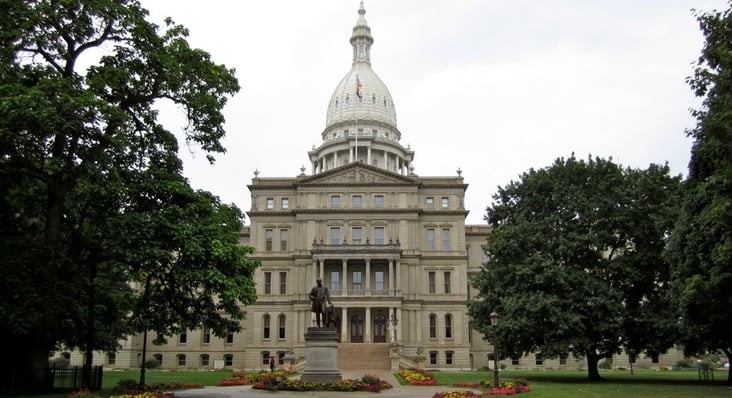
For over a year, the advanced energy industry in Michigan has engaged in a good faith effort to reshape the state’s energy policy. Throughout the process all parties have had reason to be optimistic about the legislation that would come out of this process. The level of public and stakeholder engagement led by Senator Mike Nofs, chair of the Energy and Technology Committee, was more in-depth than usual, and in March, Gov. Rick Snyder delivered an energy address that called for Michigan to reduce energy waste through increases in efficiency, as well as continue to diversify its energy portfolio with renewable energy. That’s why the pair of bills filed by Nofs and his committee vice chair took everyone by surprise.
Rather than building on the success of Michigan’s successful Energy Optimization and Renewable Portfolio Standards, SB 437 (PowerSuite users follow it here), which was filed by Nofs, would do away with these established programs in favor of a new integrated resource planning process overseen by the Michigan Public Service Commission. Additionally, the bill makes substantial changes to the state’s net metering program, reducing the economic incentive for residential solar installations.
SB 438 (PowerSuite users follow it here), sponsored by committee vice chair Senator John Proos, phases out the energy optimization program, which requires electric utilities to achieve energy reduction goals of 1 percent per year. The legislation also eliminates the state’s Renewable Portfolio Standard, which is due to sunset at the end of 2015. As a result of these and other changes to existing energy policy, the fate of the advanced energy sector would be left entirely in the hands of the Public Service Commission.
No one was surprised to see Nofs introduce an IRP process to manage the state’s energy future. Many leaders within the House and Senate had indicated that they favored this approach. What was surprising is that the IRP process, as laid out in the legislative package, would be so heavily weighted towards utility interests and away from a competitive market. In the eyes of AEE and our state partner, the Michigan Energy Innovation Business Council, that raises serious questions about the future of advanced energy in Michigan.
Chief among the concerns associated with this legislation is that it renders the regulatory process essentially toothless. No longer would utilities be required to receive a Certificate of Necessity prior to constructing a new generating unit, nor would 50% of their generating units have to be owned by private energy developers. Without the Certificate of Necessity process, regulators won’t have the tools to get the utilities to deliver on the policy goals outlined by the Governor and legislative leadership – diversifying the fuel portfolio and reducing energy waste.
Michigan’s current energy policy was put in place after careful consideration and has produced significant benefits – something we have seen consistently in states with commitments to energy efficiency and renewable energy – which include providing sustainable sources of power, diversifying energy supplies, supporting innovation, and providing billions of dollars of in-state economic growth and creating thousands of jobs throughout the state.
Senators Nofs and Proos are to be commended for the deliberate process they began with, but on the legislation that came out of it, they need to go back to the drawing board. AEE and Michigan EIBC are urging these legislative leaders to rework their bills to maintain the current policy structure. At risk is the state’s almost decade-long commitment to renewable power and reducing energy waste, which has made Michigan’s advanced energy sector a thriving part of the state’s economy.
To track legislation moving across the country, check out AEE's PowerSuite. The first 14 days are completely free!
Image courtesy of Paul Martinez and used under a Creative Commons License.
